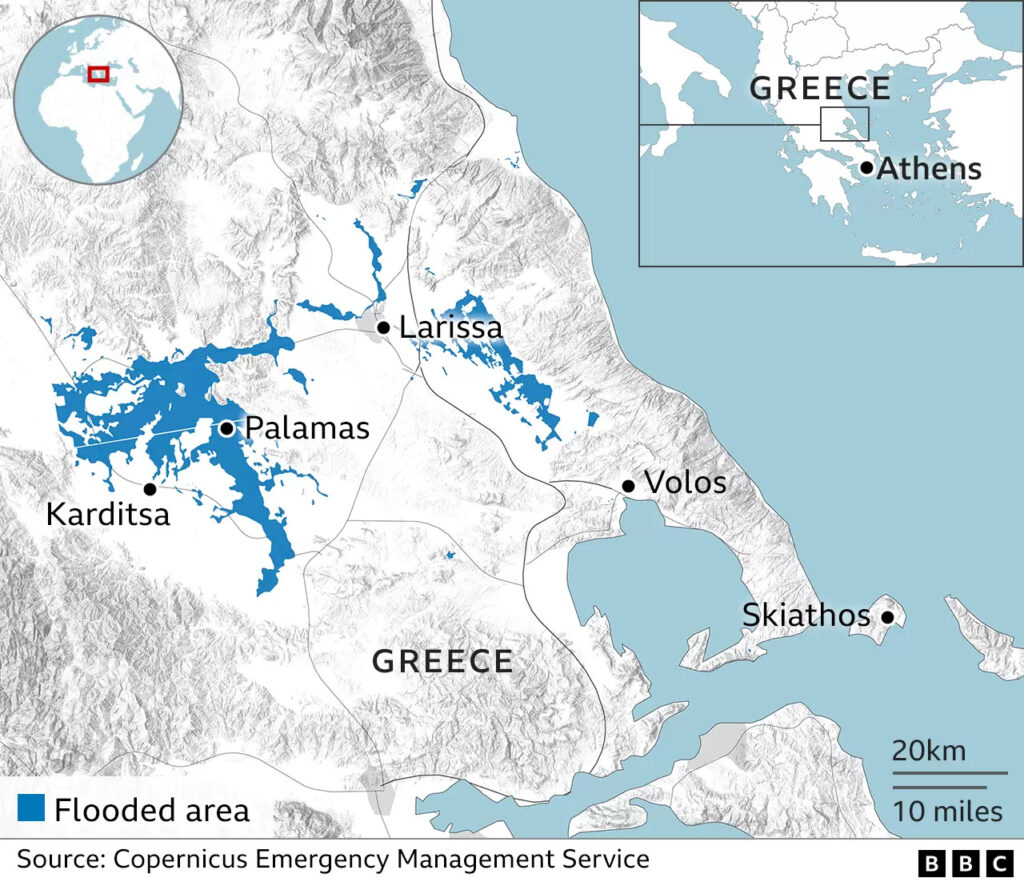Rescuers in central Greece are trying to reach hundreds of people trapped by floods that have left villages submerged and 10 people dead.
Prime Minister Kyriakos Mitsotakis has said Greeks face “a very unequal battle” with nature.
Rivers have burst their banks, while homes and bridges have been swept away after days of torrential rain.
Residents in villages around Palamas and Karditsa have appealed for food and water.
After weeks of scorching temperatures and wildfires, the plains of Thessaly have been deluged by a three-day storm.
Up to 800mm (31.5in) of rain fell in 24 hours – more than a year’s worth of rainfall – inundating the flat terrain in central Greece.
The latest city to come under threat is Larissa, home to 150,000 people, where the River Pineios has burst its banks in some suburbs.
It’s one of the biggest cities in Greece and the agricultural hub for the whole country. But nearly a quarter of this year’s crop production has been lost.
It will take years for the land to be fertile again. Where the water has receded, a thick layer of mud has been left behind.
Satellite images have shown almost 730 sq km (280 sq miles) of land in Thessaly has been flooded.
Many people in the region are furious at the Greek authorities. They accuse ministers of using climate change as an excuse for poor building projects.
One bridge collapsed because of a cyclone three years ago, so they rebuilt it. Now it’s completely destroyed again. Many Greeks see this as a symbol of government failure.

The city of Larissa is unrecognisable. Many roads are very steep. The houses at the bottom of the road are now entirely flooded, whereas the houses at the top are intact – for now.
The damage to infrastructure is enormous. Many roads are impassable and bridges destroyed because of the ferocity of the storm.
But at the same time, there are also burnt-out trees and scorched land – debris from the devastating wildfires that Greece has battled with all summer.

Xenia, a woman in her 50s with thick curly hair, is holding back tears as she watches her house from a distance – all that is visible is its yellow roof. She has lived there for more than 30 years with her family.
“I never believed that this could happen. Right now, there is about one-and-a-half metres of water in my house,” she told the BBC.
“It is destroyed completely and I have nothing left, just my job, this house and my children.
“Tonight I will be hosted by a colleague, maybe even longer. My children will sleep over at friends whose houses are safe. I might never come back to this house, where sadly I have been living my whole life, and rent a cheap apartment that I can afford with my low salary.”
The death toll has risen to 10 and at least four people are missing, according to Greece’s civil protection minister, Vassilis Kikilias. There are fears it could go up further when rescuers are able to reach more of the flooded areas.

Visiting some of the worst-affected areas, the Greek prime minister said the country was dealing with “a natural phenomenon the likes of which we have never seen before”.
Mr Mitsotakis promised to compensate people, whose houses had been destroyed or damaged, as quickly as possible.
“We will do everything humanly possible. I understand both anger and rage. I never hid, I’m always here in difficult times,” he said.
The rain has now largely stopped, but the floodwaters in some areas are in places greater than 2m (6.5ft) deep.

The coastal city of Volos has been without clean drinking water for four days. Residents were seen collecting water from fountains and the sea with buckets and barrels, reports said.
The Greek fire brigade said more than 1,800 people had been rescued across Greece since Tuesday.
It said it continued to search for several missing people, including an Austrian couple swept away with the holiday home they were spending their honeymoon in.
The flooding follows Greece’s hottest summer on record and massive wildfires in the north of the country.
Scientists say extreme weather events are becoming more frequent and more intense as a result of climate change.
Source : BBC

